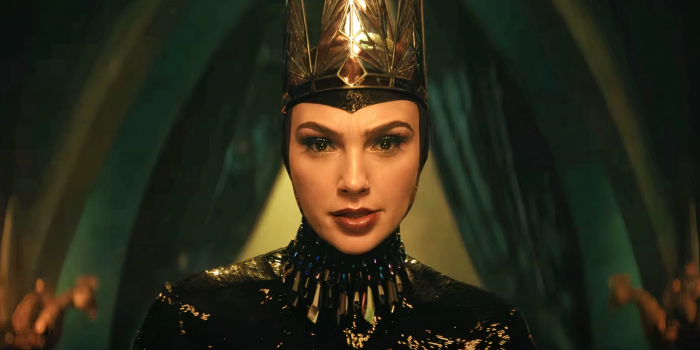By Melanie Fischer | Film | March 25, 2025

Trudging through the artificially colorful and emotionally void world of Snow White, the latest of Disney’s ever more uninspired live action remakes, there is one question that looms above all others: at what point was this project doomed?
Was there some initial spark of life that sputtered and died somewhere in the depths of Development Hell? Were director Marc Webb (The Amazing Spider-Man, Gifted) and screenwriter Erin Cressida Wilson (The Girl on the Train) ever inspired by anything here beyond the promise of a hefty paycheck? Or was it hopelessly cursed from its most nascent stages, with no true love’s kiss to save it?
Snow White is a nothingburger of a film buried under an avalanche of bluster that, watching the movie itself, feels both utterly absurd and more or less inevitable. The film is so anxiously avoidant of saying anything of substance that basically any interpretation can be projected onto it; it’s practically a Rorschach test.
Like all recent Disney remakes, Snow White is caught between near-obsessive deference to the animated original and the need to modernize—not innovate in any meaningful way, of course, but scrub out and smooth over those story elements that feel questionable or otherwise dated by 2025 standards. As Snow White and the Seven Dwarfs is the oldest film in the Disney princess canon, it’s unsurprising that there is a bit more narrative renovation going on here than most of its antecedents. The result is a veritable identity crisis of a film that wants to distance itself from the original Snow White and her dwarfs without coming up with anything particularly compelling to fill the void left behind.
In the 1937 animation, Snow White’s defining characteristics are that she is beautiful, kind, and innocent to a fault. The reboot makes obvious efforts to give the princess more agency; “Someday My Prince Will Come” is nixed in favor of a new “I Wish” song about bravery and leadership and living up to her kingly father’s legacy, although the actual plot is so beholden to the precedent of the original that most of the changes are more lipservice substance. The prince himself is also nixed in favor of a Robin Hood-esque bandit named Jonathan (Andrew Burnap, fine but forgettable) who shows no particular affinity for either robbing from the rich or giving to the poor, although he does display a knack for escaping once he gets caught (which happens repeatedly).
And then there are the dwarfs. In an effort to avoid harmful stereotypes, Snow White’s roommates are not played by actual little people but brought to unconvincing “life” as fully animated CGI eyesores that turn every scene they haunt into an unwanted trip to the uncanny valley. The VFX work is both obviously expensive and wholly unconvincing—they are always a bit too neat and perfect to look real; their skin too poreless and waxy, their eyes too beady. One can’t help but wonder whatever happened to the more practical effects and forced perspective photography techniques that brought hobbits and dwarves to life so effectively in the Lord of the Rings movies; surely there must have been a better option here? (Then again, perhaps having the dwarfs look unreal is kind of the point— after all, if they did look like actual grown men, that whole living situation would start to feel a little uncomfy, wouldn’t it?)
Overall, most of the problems with Snow White feel like a worse case of the same affliction all the recent Disney remakes have suffered, from the flavorless dialogue and garish costumes that look freshly plucked out of an Amazon package (whatever happened to agers and dyers?).
Most, but not all. Saving the worst for last, there’s Gal Gadot as the Evil Queen, a mess in a class of its own. It cannot be overstated how bad her performance is. To date, Gadot has been fortunate to benefit from a run of stoic characters that suit her default settings and highly charismatic co-stars. But Disney villains are built for camp, and that is clearly not something Gadot is capable of delivering, even bedazzled in rhinestones and glittery lipstick. Her singing inability, shoddily masked by autotune, is hardly unique among recent musicals (can we please bring back ghost singers?), but the awful acting is another matter entirely. It’s the kind of performance that’s so bad it makes you rethink any performances where you thought she was good. The lines she has to recite are hardly inspired, but her delivery consistently makes them that much worse. Her attempts at being expressive are fascinating in the worst of ways as she forces her face into clownishly exaggerated expressions that she struggles with and often fails to maintain through a full sentence.
By contrast, while the announcement of Rachel Zegler’s casting as Snow White might have caused the first of the many toxic and pointless “controversies” that have since surrounded the film, her performance is the one tiny glimpse of life here. In an age of autotune, Zegler’s bonafide chops as a triple threat truly shine, despite the best efforts of the truly atrocious bob she’s been given. If only they had a film worth shining in.
Particularly in the world of children’s entertainment, there are worse films out there. But even more so than any of those that came before it, Snow White begs the question, who are these live-action Disney remakes even for? The rough edges that Disney tries to smooth out in this one are fundamental features, not bugs, and the result is a technically expensive but creatively void film about nothing targeted at no one in particular, even if small kids will still likely be sufficiently entertained.
Snow White is now playing in theaters.